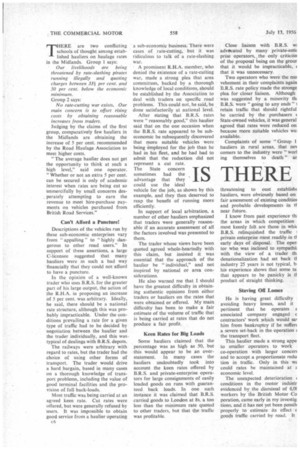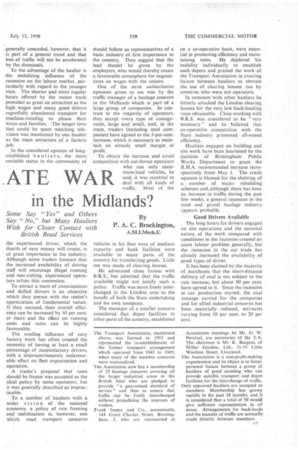THERE ATE WAR
Page 44

Page 45

If you've noticed an error in this article please click here to report it so we can fix it.
in the Midlands?
By P. A. C. Brockington,
Some Say "Yes" and Others Say. "No," but Many Hauliers Wish for Closer Contact with British Road Services
TH ERE are two conflicting schools of thought among established hauliers on haulage rates in the Midlands. Group I says:
Our livelihoods are being threatened by rate-slashing pirates running illegally and quoting charges between 33+ per cent. and 50 per cent. below the economic minimum.
Group 2 says:
No rate-cutting war exists. Our main concern is to offset rising costs by obtaining reasonable increases from traders.
Judging by the claims of the first group, comparatively few hauliers in the Midlands are obtaining the increase of 5 per cent. recommended by the Road Haulage Association to meet higher costs.
"The average haulier does not get the opportunity to think at such a high level," said one operator. "Whether or not an extra 5 per cent. can be secured is only of academic interest when rates are being cut so unmercifully by small concerns desperately attempting to earn the revenue to meet hire-purchase payments on vehicles purchased from
British Road Services." .
Can't Afford a Puncture!
Descriptions of the vehicles run by these sub-economic enterprises vary from " appalling" to "highly dangerous to other road users." In support of these assertions, a large C-licensee suggested that many hauliers were in such a bad way financially that they could not afford to have a puncture.
In the opinion of a well-known trader who uses B.R.S. for the greater part of his large output, the action of the R.H.A. in proposing an increase of 5 per cent. was arbitrary. Ideally, he said, there should be a national rate structure, although this was probably impracticable. Under the conditions prevailing a rate for a given type of traffic had to be decided by negotiation between the haulier and the trader individually, and this was typical of dealings with B.R.S. depots.
The railways were arbitrary with regard to rates, but the trader had the choice of using other forms of transport. The trader would drive a hard bargain, based in many cases on a thorough knowledge of transport problems, including the value of good terminal facilities and the provision of full back-loads.
Most traffic was being carried at an agreed keen rate. Cut rates were offered, but were generally refused by users. It was impossible to obtain good service from a haulier operating
c6 a sub-economic business. There were cases of rate-cutting, but it was ridiculous to talk of a rate-slashing war.
A prominent R.H.A. member, who denied the existence of a rate-cutting war, made a strong plea that area committees, backed by a thorough knowledge of local conditions, should be established by the Association to deal with traders on specific road problems. This could not, he said, be done satisfactorily at national level.
After stating that B.R.S. rates were "reasonably good," this haulier said that on the one occasion when the B.R.S. rate appeared to be subeconomic he subsequently discovered that more suitable vehicles were being employed for the job than he had in his fleet, and he had had to admit that the reduction did not represent a cut rate. The State concern sometimes had the advantage that they could use the ideal vehicle for the job, as shown by this example, and they then deserved to reap the benefit of running more efficiently.
In support of local arbitration, a number of other hauliers emphasized that traders were generally reasonable if an accurate assessment of all the factors involved was presented to them.
The trader whose views have been quoted agreed whole-heartedly with this claim, but insisted it was essential that the approach of the haulier be "individual," and not inspired by national or area considerations.
He also warned me that I should have the greatest difficulty in obtaining authentic opinions from either traders or hauliers on the rates that were obtained or offered. My main difficulty has been to make a fair estimate of the volume of traffic that is being carried at rates that do not produce a fair profit.
IS
Keen Rates for Big Loads Some hauliers claimed that the percentage was as high as 50, but this would appear to be an overstatement. In many cases the hauliers undoubtedly took into account the keen rates offered by B.R.S. and private-enterprise operators for large consignments of easily loaded goods on runs with guaranteed back loads. In one such instance it was claimed that B.R.S. carried goods to London at 8s. a ton less than the minimum rate quoted to other traders, but that the traffic was profitable. Close liaison with B.R.S. v(q advocated by many private-ente prise operators„ the only criticiSn of the proposal being on the grour that it would be impracticable, ( that it was unnecessary.
Two operators who were the tno vehement in their complaints again B.R.S. rate policy made the stronge plea for closer liaison. Although was suggested by a minority th B.R.S. were "going to any ends" 1 retain traffic that should rightful be carried by the purchasers ( State-owned vehicles, it was general agreed that rates were reduced on because more suitable vehicles wei available.
Complaints of some "Group 1 hauliers in rural areas, that nev corners to the industry were "won ing themselves to death" ar threatening to oust establish( hauliers, were obviously based on fair assessment of existing conditioi and probable developments in ti near future.
I know from past experience th, the areas in which competition most keenly felt are those in whic B.R.S. relinquished the traffic 1 private enterprise most readily in tt early days of disposal. The open tor who, was inclined to sympathi; with the view of a trader th. denationalization had set back tt industry 25 years is not typical, 131 his experience shows that some ta that appears to be panicky is ti product of straight thinking.
Staving Off Losses He is having great difficulty avoiding heavy losses, and it pertinent that he operates 2 associated company engaged c contractors' work which would sal him from bankruptcy if he suffer( a severe set-back in the operation ( the transport fleet.
This haulier made a strong appe to smaller operators to work , co-operation with larger concert and to accept a proportionate redu tion in traffic. Only in this WE could rates be maintained at a economic level.
The unexpected deterioration ( conditions in the motor industr evidenced by the dismissal of 6,0( workers by the British Motor Co poration, came early in my investig. tions, and it has not yet been possib properly to estimate its effect c goods traffic carried by road. It
generally conceded, however, that it is part of a general trend and that loss of traffic will not be accelerated by the dismissals.
To the advantage of the haulier is the stabilizing influence of the recession on the labour market, particularly with regard to the younger men. The shorter and more regular hours offered by the motor trade provided as great an attraction as the high wages and many good drivers regretfully abandoned transport for machine-minding to please their wives and families. The longer time that could be spent watching television was mentioned by one haulier as the main attraction of a factory job.
In the considered opinion of longestablished haulier s, the more enviable status in the community of the experienced driver, which the dearth of easy money will create, is of great importance to the industry. Although some traders forecast that the increased availability of driving staff will encourage illegal running and rate-cutting, experienced operators refute this contention.
To attract a team of conscientious and skilled drivers is an objective which they pursue with the realist's appreciation of fundamental values. If they succeed, their overall efficiency can be increased by 30 per cent. or more and the egect on running costs and rates can be highly favourable.
The eroding influence of easy factory work has often created the necessity of having at least a small percentage of unsatisfactory drivers, with a disproportionately unfavourable effect on fleet organization and operation.
A trader's proposal that rates should be frozen was accepted as the ideal policy by some operators, but it was generally described as impracticable.
To a number of hauliers with a wider vision of the national economy, a policy of rate freezing and stabilization is, however, one which road transport concerns should follow as representatives of a basic industry of first importance to the country. They suggest that the lead should be given by the employers, who would thereby create a favourable atmosphere for negotiations on wages with the unions.
One of the most authoritative opinions given to me was by the traffic manager of a haulage concern in the Midlands which is part of a large group of companies. In contrast to the majority of operators. they accept every type of consignment, large and small, and, in the main, traders (including steel companies) have agreed to the 5-per-cent. increase, which is necessary to maintain an already small margin of profit.
To obtain the increase and avoid competition with cut-throat operators who ran only maximum-load vehicles, he said, it was essential to deal with all kinds of traffic. Most of the vehicles in his fleet were of medium capacity and bank facilities were available in many parts of the country for transferring goods. Little use was made of clearing houses_ He advocated close liaison with B.R.S., but admitted that the traffic available might not justify such a policy. Traffic was more freely interchanged in the London area to the benefit of both the State undertaking and his own company.
The manager of a smaller concern considered that depot facilities in other parts of the country, established on a co-operative basis, were essential in promoting efficiency and maintaining rates. He deplored his inability individually to establish such depots and praised the work of the Transport Association in creating liaison between hauliers to obviate the use of clearing houses run by concerns who were not operators.
In common with other hauliers he bitterly attacked the London clearing houses for the very low back-loading rates obtainable. Closemorking with B.R.S. was considered to be "very necessary" and he believed that co-operative competition with the State industry promoted all-round efficiency.
Hauliers engaged on building and site work have been heartened by the decision of Birmingham Public Works Department to grant the R.H.A. recommended increase retrospectively from May 1. The credit squeeze is blamed for the shelving of a number of major rebuilding schemes and, although there has been an increase in traffic during the past few weeks, a general recession in the sand and gravel haulage industry appears probable,
Goad Drivers Available
The long hours for drivers engaged on site operations and the seasonal nature of the work compared with conditions in the factories created an acute labour problem generally, but the recession in the car trade has already increased the availability of good types of driver.
It has been claimed by the majority of merchants that the short-distance delivery of coal is not subject to the rate increase, but about 80 per cent_ have agreed to it. Since the recession in car production started, the coal tonnage carried for the companies and for allied industrial concerns has been _materially reduced, estimates varying from 10 per cent. to 20 per cent.












































































































